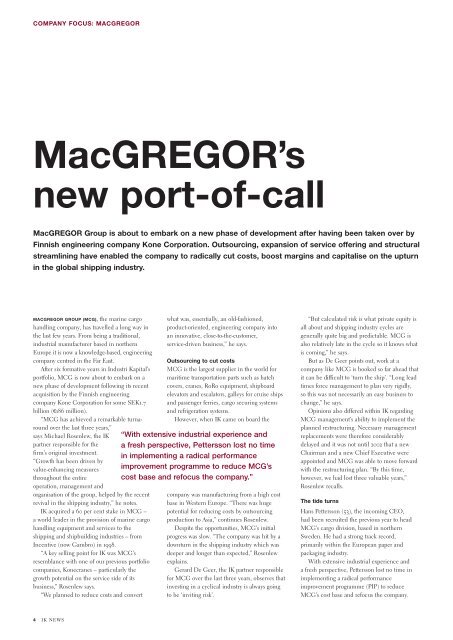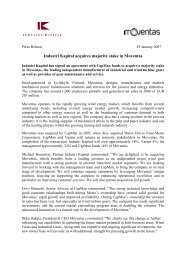Rooms for improvement - IK Investment Partners
Rooms for improvement - IK Investment Partners
Rooms for improvement - IK Investment Partners
Create successful ePaper yourself
Turn your PDF publications into a flip-book with our unique Google optimized e-Paper software.
COMPANY FOCUS: MACGREGOR<br />
MacGREGOR’s<br />
new port-of-call<br />
MacGREGOR Group is about to embark on a new phase of development after having been taken over by<br />
Finnish engineering company Kone Corporation. Outsourcing, expansion of service offering and structural<br />
streamlining have enabled the company to radically cut costs, boost margins and capitalise on the upturn<br />
in the global shipping industry.<br />
MACGREGOR GROUP (MCG), the marine cargo<br />
handling company, has travelled a long way in<br />
the last few years. From being a traditional,<br />
industrial manufacturer based in northern<br />
Europe it is now a knowledge-based, engineering<br />
company centred in the Far East.<br />
After six <strong>for</strong>mative years in Industri Kapital’s<br />
portfolio, MCG is now about to embark on a<br />
new phase of development following its recent<br />
acquisition by the Finnish engineering<br />
company Kone Corporation <strong>for</strong> some SEK1.7<br />
billion (€186 million).<br />
“MCG has achieved a remarkable turnaround<br />
over the last three years,”<br />
says Michael Rosenlew, the <strong>IK</strong><br />
partner responsible <strong>for</strong> the<br />
firm’s original investment.<br />
“Growth has been driven by<br />
value-enhancing measures<br />
throughout the entire<br />
operation, management and<br />
organisation of the group, helped by the recent<br />
revival in the shipping industry,” he notes.<br />
<strong>IK</strong> acquired a 60 per cent stake in MCG –<br />
a world leader in the provision of marine cargo<br />
handling equipment and services to the<br />
shipping and shipbuilding industries – from<br />
Incentive (now Gambro) in 1998.<br />
“A key selling point <strong>for</strong> <strong>IK</strong> was MCG’s<br />
resemblance with one of our previous portfolio<br />
companies, Konecranes – particularly the<br />
growth potential on the service side of its<br />
business,” Rosenlew says.<br />
“We planned to reduce costs and convert<br />
what was, essentially, an old-fashioned,<br />
product-oriented, engineering company into<br />
an innovative, close-to-the-customer,<br />
service-driven business,” he says.<br />
Outsourcing to cut costs<br />
MCG is the largest supplier in the world <strong>for</strong><br />
maritime transportation parts such as hatch<br />
covers, cranes, RoRo equipment, shipboard<br />
elevators and escalators, galleys <strong>for</strong> cruise ships<br />
and passenger ferries, cargo securing systems<br />
and refrigeration systems.<br />
However, when <strong>IK</strong> came on board the<br />
“With extensive industrial experience and<br />
a fresh perspective, Pettersson lost no time<br />
in implementing a radical per<strong>for</strong>mance<br />
<strong>improvement</strong> programme to reduce MCG’s<br />
cost base and refocus the company.”<br />
company was manufacturing from a high cost<br />
base in Western Europe. “There was huge<br />
potential <strong>for</strong> reducing costs by outsourcing<br />
production to Asia,” continues Rosenlew.<br />
Despite the opportunities, MCG’s initial<br />
progress was slow. “The company was hit by a<br />
downturn in the shipping industry which was<br />
deeper and longer than expected,” Rosenlew<br />
explains.<br />
Gerard De Geer, the <strong>IK</strong> partner responsible<br />
<strong>for</strong> MCG over the last three years, observes that<br />
investing in a cyclical industry is always going<br />
to be ‘inviting risk’.<br />
“But calculated risk is what private equity is<br />
all about and shipping industry cycles are<br />
generally quite big and predictable. MCG is<br />
also relatively late in the cycle so it knows what<br />
is coming,” he says.<br />
But as De Geer points out, work at a<br />
company like MCG is booked so far ahead that<br />
it can be difficult to ‘turn the ship’. “Long lead<br />
times <strong>for</strong>ce management to plan very rigidly,<br />
so this was not necessarily an easy business to<br />
change,” he says.<br />
Opinions also differed within <strong>IK</strong> regarding<br />
MCG management’s ability to implement the<br />
planned restructuring. Necessary management<br />
replacements were there<strong>for</strong>e considerably<br />
delayed and it was not until 2002 that a new<br />
Chairman and a new Chief Executive were<br />
appointed and MCG was able to move <strong>for</strong>ward<br />
with the restructuring plan. “By this time,<br />
however, we had lost three valuable years,”<br />
Rosenlew recalls.<br />
The tide turns<br />
Hans Pettersson (53), the incoming CEO,<br />
had been recruited the previous year to head<br />
MCG’s cargo division, based in northern<br />
Sweden. He had a strong track record,<br />
primarily within the European paper and<br />
packaging industry.<br />
With extensive industrial experience and<br />
a fresh perspective, Pettersson lost no time in<br />
implementing a radical per<strong>for</strong>mance<br />
<strong>improvement</strong> programme (PIP) to reduce<br />
MCG’s cost base and refocus the company.<br />
4 ik news
















